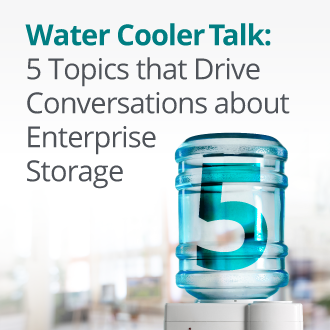Water Cooler Talk: 5 Topics that Drive Conversations about Enterprise Storage

Engaging in topical conversations around the proverbial water cooler about industry trends and new developments in storage may seem like a social custom of a pre-COVID age, but even today, in a post-COVID world, meaningful conversations about topics that we should all care about in the enterprise storage industry continue around the virtual “water cooler” – online and otherwise. I invite you to read what is in this blog post, but, then, go to my social media channels and let me know what you think about the following five topics of interest. Do you agree with me? How do you see this subject matter? Join the virtual water cooler talk.
1. Cyberattacks and the role of secondary storage for modern data protection
In the face of the cyber threats of ransomware and malware, it is imperative for organizations to implement modern data protection practices and capabilities, such as logical air gapping, fenced-in networks, immutable snapshots, and virtually instantaneous recovery. Cyber criminals are targeting data backup as well as primary storage, so the secondary storage needs to be secure and robust enough to withstand attacks. Remember, it is not if you will suffer a cyberattack, but when and how often. Infinidat offers a purpose built backup appliance (PBBA)called InfiniGuard® that nullifies ransomware and malware with automated functions – our InfiniSafe® that ensure business continuity and protect some of your company’s biggest assets: its data. When a hacker says they have taken your data ransom, you can go back to the immutable snaps and simply ignore the cybercriminal. There is no need to pay any “ransom.”
2. Warning signs of data complexity
When data is overly complex, it’s in silos and it is costly to utilize. This is a nightmare that storage administrators too often tolerate. When you consolidate storage arrays down, however, you reduce the number of independent silos that you have to manage, dramatically simplifying the entire data process.

Data complexity invariably arises from having too many storage arrays. If you have 40 arrays, it’s naturally more complex to try to find specific data on which physical box it resides on -- compared to having two arrays that do the equivalent of 40 arrays. You know it’s on one of the two boxes, so it significantly reduces complexity and operation manpower. CIOs like consolidation because reduced complexity means reduced costs, reduced waste, and streamlined IT processes.
3. Evolution of Kubernetes from container orchestrator to infrastructure control plane
Most enterprises look to work with a storage solution provider that has a strong presence in the cloud service provider market. If cloud service providers are relying on a storage platform, then CIOs and IT decision-makers can be confident that the storage capabilities are top-notch and proven.
Infinidat has had tremendous success in the public cloud service provider community. We have a number of customers using our InfiniBox® and InfiniGuard enterprise storage solutions. One particular CSP is solely focused on providing services to healthcare companies. They do as many as 90,000 back-ups per day using Infinidat technology. Because of our impeccable record in regulated markets, Infinidat excels in markets with stringent requirements, ranging from CSPs and managed service providers (MSPs) to large enterprises.
4. Shift from simply managing infrastructure to managing the reliability and efficiency of applications
It’s so true that there has been a shift to focus on managing applications, not managing the infrastructure. We hear from many CIOs about how a set-it-and-forget-it approach is the preferred mode to reinforce this focus on applications. They want the storage system to be automated and autonomous. One CIO of a large enterprise customer told me, “We implemented the InfiniBox three years ago. I have never had to think about the storage – the InfiniBox just takes care of itself.”
With our Neural Cache, we enable automated adjustments to changes in the application infrastructure, reflecting a set-it-and-forget-it mentality. If you took three more servers and point them at our storage system, we automatically and autonomously handle it and optimize the performance of the applications and workloads without painful and extensive “performance tuning” – the InfiniBox just does it. To go even further, our support for Red Hat’s Ansible Framework allows the storage admin to let the DevOps team and ops team to play with the storage without messing it up.
5. Reducing CAPEX and OPEX through storage consolidation
We have a customer in Europe who went from 14 PBBAs to just 2 InfiniGuards, saved on both CAPEX and OPEX. Another global Fortune 500 has saved close to $100M in CAPEX and OPEX with Infinidat’s storage platforms. To have  vast sets of arrays means the need for more rack space, more power, more cooling and more daily operational management. Consolidation reduces CAPEX and OPEX. A set-it-and-forget-it approach lowers operational manpower. You don’t need to set up RAID groups or luns or play with the storage to optimize for the applications performance needs or do any other configuration. With other systems from competitors, even at the highest end of their families, you still have to configure and closely manage, which substantially increases your costs.
vast sets of arrays means the need for more rack space, more power, more cooling and more daily operational management. Consolidation reduces CAPEX and OPEX. A set-it-and-forget-it approach lowers operational manpower. You don’t need to set up RAID groups or luns or play with the storage to optimize for the applications performance needs or do any other configuration. With other systems from competitors, even at the highest end of their families, you still have to configure and closely manage, which substantially increases your costs.
You can engage with me in conversation about these water cooler topics on social media on Twitter - @zoginstor and on LinkedIn.



